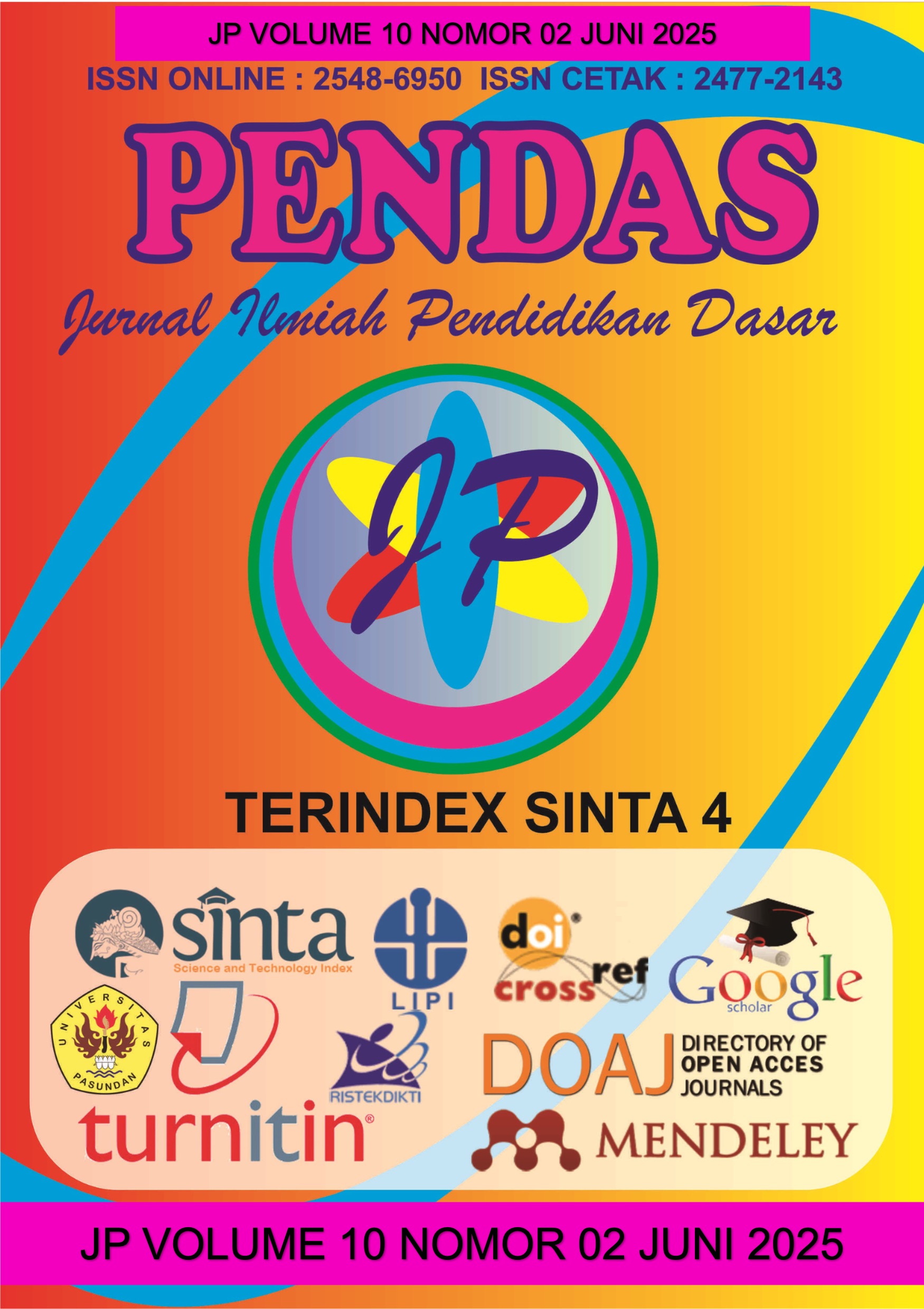KEBERTERIMAAN MEDIA PEMBELAJARAN BERBASIS WEBSITE “ALAT GERAK HEWAN DAN MANUSIA” DENGAN ALUR MERDEKA DI SEKOLAH DASAR WILAYAH BANTEN
DOI:
https://doi.org/10.23969/jp.v10i02.24548Keywords:
ACCEPTANCE, FLOW MERDEKA, WEBSITE.Abstract
The use of technology in the learning process in schools is currently often used to support teachers in teaching. The use of technology in education by teachers in elementary schools can enrich students' learning experiences, so it is important for teachers to use technology as a tool in learning. Web-based learning media is one form of technology utilization in education, which is implemented in the teaching and learning process using technology. Research on the use of website-based learning media has received a good response, and researchers will research the acceptance of Website-Based Learning Media with the Merdeka Flow Model (Starting from self, Elaboration, Collaboration Space, Demonstration and Real Action) by teachers throughout Banten. This research was conducted using a quantitative research approach. The research method used by researchers is a correlational survey with path analysis. The results of the study show that the creation of website-based digital media with a free flow in the Banten region was well received, this can be seen from the results of Self-Efficacy (Self-Application) which has a relationship with Behavioral Intention (Technology Acceptance) which has good acceptance seen from the value above that the response results related to these indicators are influenced by self-influence and efforts to use media which are the main determinants in the acceptance and effectiveness of learning media.
Downloads
References
Akbar, A., & Noviani, N. (2019, July). Tantangan dan solusi dalam perkembangan teknologi pendidikan di Indonesia. In Prosiding Seminar Nasional Program Pascasarjana Universitas Pgri Palembang.
Andrizal, A., & Arif, A. (2017). Pengembangan Media Pembelajaran Interaktif Pada Sistem E-Learning Universitas Negeri Padang. INVOTEK: Jurnal Inovasi Vokasional Dan Teknologi, 17(2), 1-10.
Anggraeni, S. T., Muryaningsih, S., & Ernawati, A. (2020). Analisis faktor penyebab kesulitan belajar matematika di sekolah dasar. Jurnal Riset Pendidikan Dasar (JRPD), 1(1), 25-37.
Aurora, A., & Effendi, H. (2019). Pengaruh penggunaan media pembelajaran e-learning terhadap motivasi belajar mahasiswa di Universitas Negeri Padang. JTEV (Jurnal Teknik Elektro Dan Vokasional), 5(2), 11-16.
Bashir, M. F., Jiang, B., Komal, B., Bashir, M. A., Farooq, T. H., Iqbal, N., & Bashir, M. (2020). Correlation between environmental pollution indicators and COVID-19 pandemic: a brief study in Californian context. Environmental research, 187, 109652.
Dikilitaş, K., & Mumford, S. E. (2020). Preschool English teachers gaining bilingual competencies in a monolingual context. System, 91, 102264.
Grossman, M. (2017). The demand for health: a theoretical and empirical investigation. Columbia university press.
Hair, J. F., Risher, J. J., Sarstedt, M., & Ringle, C. M. (2019). When to use and how to report the results of PLS-SEM. European business review, 31(1), 2-24.
Mardi, M. (2022). Pendidikan Seks pada Anak Usia Dini: Implementasi dan Pencegahan Pelecehan Seksual. Journal of Economic and Islamic Research, 1(01), 102-112.
Muhson, A. (2022). Analisis Statistik dengan SmartPLS: Path Analysis, Confirmatory Factor Analysis, & Structural Equation Modeling. Universitas Negeri Yogyakarta.
Mukaromah, E. (2020). Pemanfaatan Teknologi Informasi dan Komunikasi dalam Meningkatkan Gairah Belajar Siswa. Indonesian Journal of Education Management & Administration Review, 4(1), 175-182.
Khoir, M., Saiban, K., & Mustofa, M. (2023). Implementation of Islamic Religious Education (PAI) Learning in the Formation of Religious Character and Social Concern Attitudes. EDU-RELIGIA: Jurnal Keagamaan dan Pembelajarannya, 6(1), 23-32.
Nucifera, P., Yakob, M., & Setyoko, S. (2022). Pelatihan media pembelajaran berbasis digital bagi guru di SMPN 1 Rantau Selamat Aceh Timur. ABSYARA: Jurnal Pengabdian Pada Masyarakat, 3(2), 217-225.
Rahayu, M. W., & Darsinah, D. (2024). Analisis Perencanaan Pembelajaran dalam Pengembangan Kreativitas untuk Mewujudkan Profil Pelajar Pancasila. Murhum: Jurnal Pendidikan Anak Usia Dini, 5(1), 51-60.
Rahma, F. A., Harjono, H. S., & Sulistyo, U. (2023). Problematika Pemanfaatan Media Pembelajaran Berbasis Digital. Jurnal Basicedu, 7(1), 603-611.
Rahmawati, L. E., Hidayat, N., & Kurniawan, A. (2021). Impoliteness of directive speech acts in online Indonesian language learning. Journal of Pragmatics Research, 3(2), 97-107.
Salsabila, F., & Aslam, A. (2022). Pengembangan media pembelajaran berbasis web google sites pada pembelajaran IPA Sekolah Dasar. Jurnal basicedu, 6(4), 6088-6096.
Suryandaru, N. A., & Setyaningtyas, E. W. (2021). Pengembangan media pembelajaran berbasis website pada muatan pembelajaran matematika kelas IV. Jurnal Basicedu, 5(6), 6040-6048.
Suanah, S. (2019). Pengembangan media pembelajaran berbasis web desain wix materi bangun ruang matematika SD Kelas V. Proceedings of the ICECRS, 2(1), 243-252.
Sitepu, E. N. (2022). Media Pembelajaran Berbasis Digital. Prosiding Pendidikan Dasar, 1(1), 242-248.
Prayogi, R. D. (2020). Kecakapan abad 21: Kompetensi digital pendidik masa depan. Manajemen Pendidikan, 14(2).
Yunansah, H., Yuniarti, Y., Herlambang, Y. T., Wahid, R., & Hendriyani, A. (2022). Rancang bangun media bahan ajar digital berbasis multimodality dalam pendekatan pedagogik futuristik. Naturalistic: Jurnal Kajian dan Penelitian Pendidikan dan Pembelajaran, 6(2), 1136-1149.
Downloads
Published
Issue
Section
License
Copyright (c) 2025 Pendas : Jurnal Ilmiah Pendidikan Dasar

This work is licensed under a Creative Commons Attribution 4.0 International License.














































